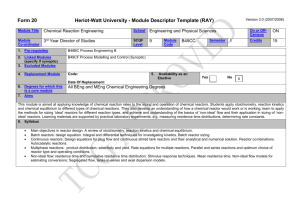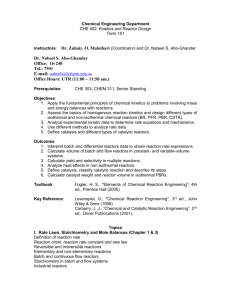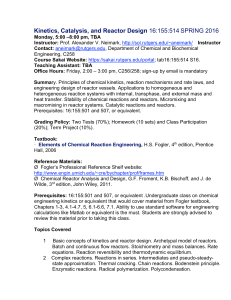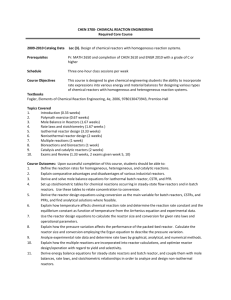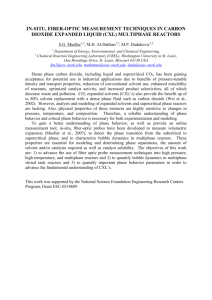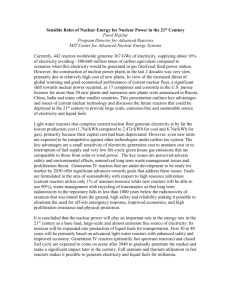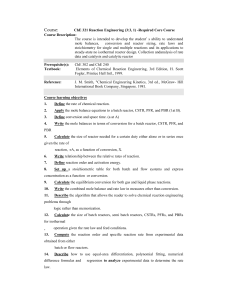COVENANT UNIVERSITY 2012/2013 Academic Session College
advertisement
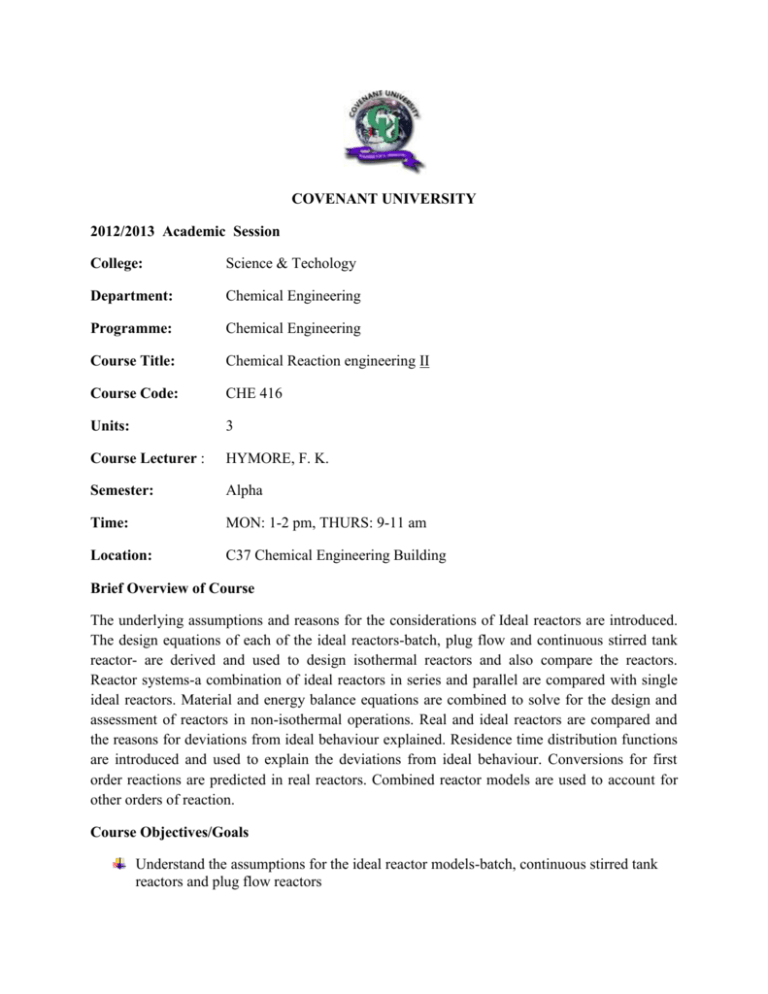
COVENANT UNIVERSITY 2012/2013 Academic Session College: Science & Techology Department: Chemical Engineering Programme: Chemical Engineering Course Title: Chemical Reaction engineering II Course Code: CHE 416 Units: 3 Course Lecturer : HYMORE, F. K. Semester: Alpha Time: MON: 1-2 pm, THURS: 9-11 am Location: C37 Chemical Engineering Building Brief Overview of Course The underlying assumptions and reasons for the considerations of Ideal reactors are introduced. The design equations of each of the ideal reactors-batch, plug flow and continuous stirred tank reactor- are derived and used to design isothermal reactors and also compare the reactors. Reactor systems-a combination of ideal reactors in series and parallel are compared with single ideal reactors. Material and energy balance equations are combined to solve for the design and assessment of reactors in non-isothermal operations. Real and ideal reactors are compared and the reasons for deviations from ideal behaviour explained. Residence time distribution functions are introduced and used to explain the deviations from ideal behaviour. Conversions for first order reactions are predicted in real reactors. Combined reactor models are used to account for other orders of reaction. Course Objectives/Goals Understand the assumptions for the ideal reactor models-batch, continuous stirred tank reactors and plug flow reactors Ability to use the design equations of the reactors to design and assess the performance of ideal reactors in isothermal operation. Use the energy balance equation, in combination with the design equations to design and assess the performance of reactors in non-isothermal operations Compare ideal with real reactors and explain deviations from ideal behaviour Residence time distribution functions Predictions of conversions in real reactors for first order reactions. Use of combined reactor models to account for conversions in real reactors Method of Lecture Delivery/Teaching Aids Power point Slides Multimedia Interactive lecture sessions in Class rooms Course Outlines Module 1 Ideal reactors –assumptions and reasons for their considerations Material balance and design equations for ideal reactors Comparison of the performances of single ideal reactors for isothermal reactions Comparison of the performances of single and combined ideal reactors for isothermal reactions Solving the design equations for isothermal multiple reactions Module 2 Enthalpy, heat of reaction and equilibrium constant as a function of temperature Energy balance equations for reactors Combination of energy balance and design equations to solve non-isothermal operations of reactors in steady state. Optimum reaction temperature for single and multiple reactions Adiabatic operations of ideal reactors Non-adiabatic operation of ideal reactors Inter-stage heating/cooling of reactors Module 3 Real reactors and deviations from ideal reactors Measurement of Residence time distribution in vessels. Residence time distribution functions and their relationships Residence time distribution functions of ideal and real reactors Tutorials One hour of tutorial for every two hours of interactive lectures Structure of Programme/ method of grading The final course grade will be weighted according to the following scheme: Assignments & Quizzes 15% Mid Semester Test 15% Semester Exam 70% Ground rules & regulations Unannounced quizzes will be given (generally once each week) to reinforce important principles and to encourage preparation for class. Only official University/medical excuse will be tolerated for absence from quiz. Some quizzes will be given during tutorials Topic for Term paper/ Assignment /Student Activiteis Investigations of the reactions of the airbag: How does it work and what are the limitations? Alignment With covenant University Vison/Goals The course is in line with producing chemical engineers capable of facing the challenges of the profession Contemporary Issues/ Industry relevance The reactor is the central feature of most chemical processes. Their performances determine to a large extent, the cost of the overall process .The problems discussed are a combination of theoretical and actual problems. Recommended reading/Text Coker, A. K. Modeling of Chemical Kinetics and Reactor Design, Gulf Publishing Company, Houston, Texas, 2001 Levenspiel, O., Chemical Reaction Engineering, 3rd ed., John Wiley and Sons, New York 1999 Fogler, H. S., Elements Of Chemical Reaction Engineering,,2nd ed., Prentice-Hall , International,1995 Nauman, E.B., Chemical Reactor Design, Optimization, and Scaleup, McGraw-Hill, NEW York 2002
